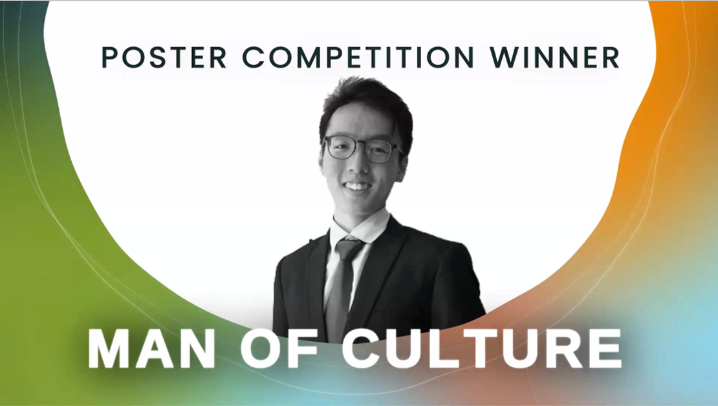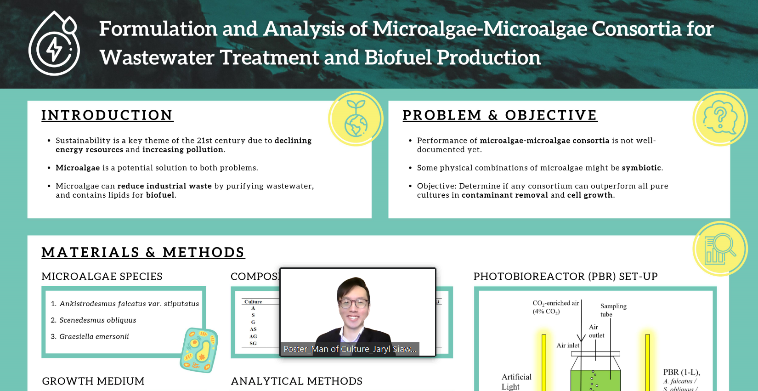My Research Experience: Trials, Tribulations, and Takeaways
Jaryl Siaw Wen Han
Year 3 Student, NUS Chemical Engineering
I twiddled my thumbs in nervous anticipation as the prize winners for the poster category were announced through the live stream. At that moment, the only sound I could hear amidst the deafening silence of my room was the incessant pounding of my heartbeat. Months of blood, sweat and tears had finally come down to this moment of truth.
“And the winner is…”
I swear my heart skipped a beat.
“Man of Culture!”

My jaw dropped when I saw my Team Name and face flash up on my screen. I had hoped for the best but expected the worst, so this news still came as a massive shock to me. As the only solo participant out of eight regional finalist teams shortlisted for the grand finals, winning the AIChE Indonesia Student Conference (AISC) 2021 Poster Competition had initially seemed like a mere pipe dream. A whirlpool of emotions stirred within me as I struggled to structure my victory speech in the few seconds of time that I had. With the reality of winning starting to sink in, I breathed a sigh of relief as I reminisced on how far I had come since I first embarked on my undergraduate research project.
Looking back, it was all worth it.
The Catalyst
I’ve been fascinated with environmental sustainability and the mysteries of life for as long as I can remember, and decided to major in chemical engineering to acquire technical knowledge that would allow me to contribute to the relevant industries. As a first-year student back in early 2019, I was brimming with excitement for the future. The foundational lab modules in chemical engineering were engaging and insightful, and I was raring to broaden my horizons and learn more about the various specialisations of chemical engineering. In particular, I was fascinated by microalgae biofuels, and wanted to see how I could gain some domain knowledge about the field early on in my undergraduate journey by enrolling in the Undergraduate Research Opportunities Programme (UROP). In doing so, I also hoped to gain an appreciation of higher-level modules I would take in the near future. I remember beaming with excitement as I approached Associate Professor Tong Yen Wah after a lecture to ask if I could explore my research interests further with his help.
The Study
With declining global supplies of petroleum and natural gas, coupled with increasing levels of industrialisation and urbanisation in developing nations, sustainability has grown to become a key theme of the 21st century. Accordingly, developing new technology to combat environmental pollution and serve as a feasible source of alternative energy is of paramount importance today.
This cause served as the premise for my study – I was aware that microalgae were being explored for biofuel production due to their high lipid content, as well as for wastewater treatment due to their ability to proliferate through absorbing nutrients from the surrounding environment.
While there have been substantial attempts to elucidate the interactions of microalgae with various other microorganisms such as bacteria and yeast, I noticed that there were few publications documenting the performance of microalgae-microalgae consortia (in other words, co-cultures). With at least 40,000 species currently known to mankind, microalgae are incredibly diverse, and several species of microalgae might thrive within the same aquatic environment. Convinced that this might provide an avenue for some form of symbiosis to occur, I began my quest to explore how several combinations of 3 different microalgae species would fare against their corresponding pure cultures, in terms of cell growth and overall nutrient removal in a bioreactor containing synthetic tertiary wastewater.
The Challenges
I’m not going to delve too much into the contents of my study, because everyone’s UROP experience is going to be pretty different. With that said, research is far from being a bed of roses, and there were some challenges and difficulties that I faced over the course of my UROP, which I’m sure many other student researchers can relate to.
1. Research is Open-Ended
In stark contrast to what your lectures might suggest, there’s often no right answer (or even right approach) to solving research problems. While this might depend on whether your professor wants you to serve as extra manpower in their research team, or engage in an entirely new study on your own, you’ll realise that you might need to take calculated risks at times, and decide on your research scope and objectives with minimal guidance.
2. Embrace Failure
In all likelihood, you will fail. Then again, this shouldn’t really come as a surprise, given the unpredictable nature of research, and perhaps some anecdotal advice from PhD students who you may have chitchatted with during your laboratory sessions. Nevertheless, it’s crucial to prepare yourself sufficiently for the reality of the situation, lest you go in starry-eyed with the goal of publishing your findings in a scientific journal (a feat which few are able to achieve – I haven’t either). Failure comes in many forms: You might forget to add a particular reagent into your reaction mixture and end up ruining a week of preparation work, or accidentally contaminate your culture samples through improper sterilisation. And of course, perhaps it could also be a classic case of nothing works and nobody knows why. The process of research is like navigating your way through a sandstorm: The path ahead may be uncertain and your spirit may be battered and worn, but you need to grit your teeth and carry on if you want any chance at success.
3. Time’s Up
While the UROP is often a semester-long endeavour, you might be able to extend it to a second semester if you need extra time to conduct more research or write your report. However, that’s the hard limit for all UROP projects, and you need to submit your deliverables in time to pass this module and receive your academic credits for it. Ending the UROP may serve as a source of relief to some, but also as a source of regret to others. As if it wasn’t already hard enough to grapple with repeated failure, your seemingly-ceaseless pursuit of success may be unceremoniously terminated by this technical restriction. This effectively prevents you from trying over and over again until you obtain substantial results, and might make it seem as though all your effort was for naught. Words alone cannot possibly describe the overwhelming sense of frustration when your journey comes to a premature end, but these trials and tribulations also teach us to celebrate and appreciate our small successes, instead of lamenting our shortfalls.
The Takeaways
All this may sound pretty daunting at this point, especially if you’re a first-year student like I was when I decided to take a leap of faith. I won’t deny that the road of research is a bumpy one with loads of ups and downs, but it won’t be a waste of time if you keep your mind open. My research experience taught me much about my specific field of interest, but there were plenty of other takeaways as well!
1. Blending Inquiry with Design
A few years ago, the chemical engineering curriculum at NUS used to mandate students to complete a dissertation as part of the graduation requirements. While this is no longer the case, I firmly believe that everyone should at least consider taking up a UROP to experience engineering research, and engage in independent scientific inquiry. Science is intricately linked with engineering, and lays the fundamental groundwork of laws and principles upon which engineering builds upon. By engaging in a UROP, you get to be at the forefront of research, and obtain valuable insights on emerging technologies that have yet to be commercially implemented. Doing a UROP enables you to blend inquiry with design, and opens your eyes to how science in the laboratory morphs into technology in the market. Additionally, it can inculcate higher-order thinking skills where you critically evaluate your research question, and investigate varied approaches to shed new light on the subject matter.
2. Data Analysis & Visualisation
Speaking of skills, another transferable and increasingly hot skill that you can gain from a UROP stems from the growing pile of raw data that accumulates as your research proceeds! Whether you may be doing a project on machine learning or cell culturing, there’s a good chance that you’ll get to deal with lots of data. And yet, all this raw data is meaningless on its own, which is why you need to breathe life into it, and make it tell a compelling story. A comprehensive analysis of raw data allows you to spot key trends that may be otherwise invisible, while data visualisation allows you to convert key findings into a form that suitably and accurately communicates the significance of your research. As the world around us slowly starts to get permeated by technological disruption and big data, an excellent grasp of data analysis and visualisation techniques will undoubtedly serve you well, regardless of the field you eventually land up in after graduation.
3. Participating in Competitions

While this shouldn’t be the main motivation behind why you decide to engage in a UROP, getting a personal project to submit for competitions is certainly a pretty sweet benefit. I will reiterate that few people manage to publish their UROP findings in scientific journals, but one should always keep their eyes open for other opportunities that may come by. Admittedly, I was searching for potential avenues to showcase my research after I had completed it, but was unable to find suitable options to do so, possibly due to the untimely advent of the coronavirus in early 2020. I got wind of the AIChE Indonesia Student Conference (AISC) 2021 over a year after I had completed my UROP, and jumped at the opportunity. As I recalled the long days I had spent working tirelessly on my beloved project in the laboratory, I decided to challenge myself once again by creating a scientific poster from my UROP report, and defending my research against a panel of esteemed judges. Beyond gaining invaluable new insights from the experts whom I explained my research to, I also got to listen to the other teams presenting their posters, and understand their unique motivations and novel ideas to tackle the plethora of problems plaguing our world today. The opportunity to stand alongside future changemakers is an experience that I will treasure for years to come.
Conclusion
While this article isn’t intended to be a comprehensive guide for anyone interested in learning more about the UROP rules and guidelines, I did my best to portray undergraduate research as seen through my eyes. While there may be plenty of challenges awaiting you as you embark on your own UROP journey, take solace in the fact that there is light at the end of the tunnel, even when you feel like nothing seems to be working. Don’t be afraid to try new things, and remember to keep believing in yourself.
It will be worth it.

